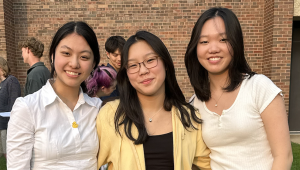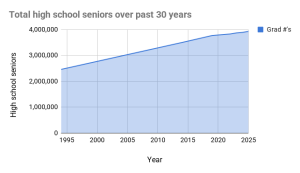Re-examine your recycling habits
March 4, 2016
We have recycling bins seemingly everywhere: at home, in restaurants, and in schools. What most people don’t realize is that much of what is in those bins can’t actually be recycled.
An upsetting percentage of the contents in a recycling bin is actually trash. This is especially prominent at New Trier.
Take a look inside a recycling bin. Odds are, there is something in there that can’t be recycled.
It actually does a lot of harm if you put a piece of trash in the recycling. Once there’s trash in the recycling, the whole bin becomes marked as trash.
Any recyclable materials that were in the bin are thrown away due to that one stray piece of trash.
We simply cannot recycle empty chip bags or greasy pizza plates. Food residue is very detrimental in the recycling process because the oil can’t separate with water, and as a result, the new paper gets oil spots.
At New Trier, we have a part-time employee who collects the recycling. Because he works part-time, he does not have the time to sort through all the recycling bins and remove the unrecyclable materials. Instead, everything in that bin must go in the trash. So, that one greasy pizza plate can actually ruin the truly recyclable materials.
In most hallways, the school has removed the swinging door on the tan trash bins in an effort to get lazy students from just tossing everything in the recycling bin. Now, the trash cans are just as accessible, yet there is still trash in the recycling.
The majority of the time, I believe the correct intentions are there. The act of recycling is seen as something that’s helping the environment, and people want to help. And it can help, but only when it’s done right.
In putting trash in the recycling, you are essentially taking all the recyclable materials and throwing them in the trash because that is where they will end up once the trash goes into the wrong bin.
While it appears as though little progress has been made in New Trier’s recycling habits, the opposite is true. There is a definite increase in the amount recycled here, according to PPS.
In fact, approximately 138 yards of recycling materials are recycled monthly.
However, this number could be much higher if the amount of trash that finds its way into the recycling bins was reduced.
It takes less than five seconds to recycle something, but it’s not worth the time if you aren’t going to do it right.
We need to focus more on the impact of our actions. One apparently helpful thing has become much less beneficial to the environment, and we are at fault. Fortunately, we are also able to fix that.
If students become more aware of what can and cannot be recycled, our recycling habits could improve. New Trier would be able to recycle more materials and less trash would end up in the recycling bins.
Only positive environmental benefits can come of those improvements, and they will push our school in a more eco-friendly direction.
We have to be the voice for our Earth. We are the ones destroying it, but we are also the ones who can help it.
Next time you are about to “recycle” your greasy plates or food-ridden napkins, stop and think about where that will end up and what will come with it. It is our job to protect our environment, not endanger it.











































